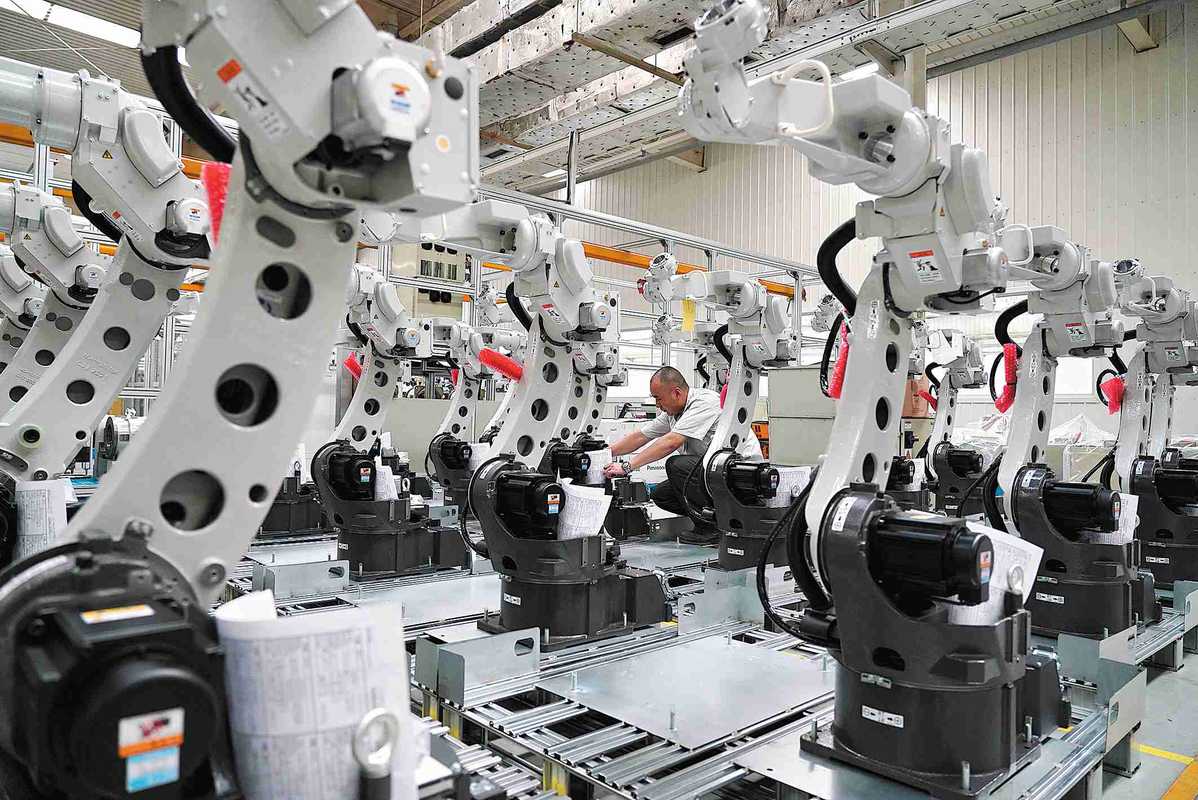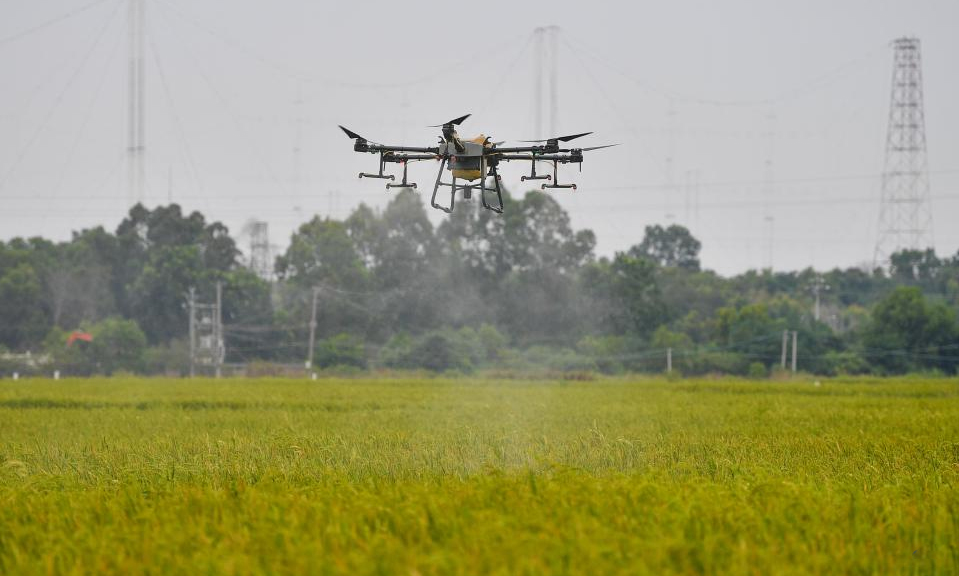Nation takes giant strides with innovation

[SONG CHEN/CHINA DAILY]
Key advances being made in fields of science, technology
China's unwavering efforts to pursue innovation-driven growth and promote in-depth integration of cutting-edge technologies including artificial intelligence, 5G and big data with the real economy have drawn praise from experts.
They said these advances will further bolster digital transformation and upgrading of industries, and inject fresh impetus into the nation's high-quality economic development.
China is playing an increasingly important role in promoting scientific and technological innovation, helping safeguard the stability of worldwide industrial and supply chains, and driving global economic recovery amid downward pressures and uncertainties at home and abroad, the experts added.
During the 14th Five-Year Plan (2021-25) period, the nation will uphold the central role of innovation in its modernization drive and take self-reliance in science and technology as the strategy underpinning national development.
Long Haibo, a senior researcher at the Development Research Center of the State Council, said: "Innovation is the key driver of global economic growth. The worldwide economic recovery is facing severe challenges against the backdrop of the COVID-19 pandemic and multiple uncertainties. Therefore, it is necessary to jointly explore and find solutions to global problems through scientific and technological innovation."
Noting that emerging digital technologies such as 5G, artificial intelligence, the industrial internet, big data and blockchain are gaining momentum and accelerating digitalization in a wide range of traditional industries, including manufacturing and agriculture, Long said more efforts are needed to step up investment in frontier technologies and gain a competitive edge in key fields.
China's strength in science and technology innovation has taken a qualitative leap in recent years. According to the 2022 Global Innovative Index released by the World Intellectual Property Organization, the nation has risen to 11th place and remains the only middle-income economy in the top 30. The index ranks the world's economies annually on innovation capacity and output.
Artificial intelligence, a key technology for driving digital transformation, has played a vital role in speeding the nation's push for industrial upgrading. Significant progress has been made in developing China's AI industry, with technological innovation capabilities in some areas ranking among the best in the world, according to experts.
A Stanford University report shows that China filed more than half the world's AI patent applications last year, and the nation continued to lead the world in the number of AI journals, conference papers and related publications.
The report said Chinese researchers have been the most prolific in recent years, publishing 27.5 percent of all AI journal articles worldwide, while researchers from the United States accounted for 12 percent. Articles in Chinese journals also topped those of other nations for citations, an indicator of their scientific importance.
According to the Ministry of Industry and Information Technology, or MIIT, the value of China's core AI industries exceeds 400 billion yuan ($55.92 billion), and the number of related enterprises stands at more than 3,000, with major breakthroughs being made in key core technologies such as smart chips and open-source frameworks.
The nation has issued a plan setting benchmarks for its AI sector, with the value of core AI industries predicted to exceed 1 trillion yuan, making China one of the global leaders in such innovation by 2030.
Chinese technology companies have invested heavily in research and development based on AI. In 2017, Baidu was chosen to lead the establishment of the AI national laboratory on deep learning. Self-driving technologies are important for this national research project.
Robin Li, co-founder and CEO of Baidu, said the application of AI technology is reshaping the industrial landscape and will be a transformative force revolutionizing development over the next 40 years.
The goal for the intelligent transformation of industries and society brought by AI is to fulfill people's needs — making technology meaningful only if it serves humanity by creating more value and contributing to society, Li said.

An employee checks welding robots at a manufacturer in Tangshan, Hebei province. [Photo/Xinhua]
Remarkable progress
China has witnessed remarkable achievements in advancing development of the 5G telecommunications network and using next-generation wireless technology for the digitalization of different sectors.
As of the end of July, the nation had set up some 1.97 million 5G base stations, with all prefecture-level cities, counties and 96 percent of towns equipped with 5G network coverage, according to the MIIT.The number of 5G mobile users in China has reached 475 million.
Speaking at the 2022 World 5G Convention in Harbin, Heilongjiang province, in August, Zhang Yunming, vice-minister of industry and information technology, said efforts will be stepped up to advance the construction of 5G networks, encourage upstream and downstream enterprises in the 5G industrial chain to strengthen cooperation, and accelerate the large-scale application of 5G technology.
Zhang said China has entered a crucial period for 5G commercialization, with the superfast wireless technology being applied to 40 of the 97 major economic categories, and large-scale application expanded to mines and ports.
The China Academy of Information and Communications Technology, a government think tank, said the nation is likely to spend 1.2 trillion yuan on 5G network construction, which will drive more than 3.5 trillion yuan of investment in the upstream and downstream industrial chain and related sectors by 2025.
Wang Zhiqin, deputy head of the academy, said the 5G industry is expected to directly create more than 3 million jobs by 2025, with its information market resulting from the commercialization of the wireless technology surpassing 8.3 trillion yuan.
Xiang Ligang, director-general of the Information Consumption Alliance, a telecom industry association, said 5G technology is being applied in a wide range of industries and scenarios, including video conferencing, online medical consultations, remote education, short videos, livestreaming events and games.
China is also committed to promoting the application of 5G technology in the industrial internet, supporting initial public offerings of eligible industrial internet companies, and accelerating innovation of key technologies to advance enterprises' digital transformation, according to the MIIT.
To date, the nation has cultivated 150 large-scale industrial internet platforms, which are connected to more than 79 million units of industrial equipment.
Experts also stressed the importance of boosting self-reliance in core technologies and key fields, which is crucial to ensuring independent and controllable industrial and supply chains.
Wang Yiming, vice-chairman of the China Center for International Economic Exchanges, said that against the backdrop of an increasingly complicated and grim external environment, technological innovation is not only a matter of development, but also of survival.
"Only by pursuing self-reliance in core technologies and key fields can we break the monopoly of some countries in high-tech sectors," Wang said.
China has made great strides in boosting advances in technologies, but it is still reliant on developed countries for key and core technologies such as high-end chips, aircraft engines, core robotic components and premium medical equipment, Wang added.
He called for heightened efforts to strengthen the nation's independent innovation capacities, achieve breakthroughs in resolving bottleneck problems, and increase investment in basic research and strategic forward-looking technologies.
Chen Duan, director of the Digital Economy Integration Innovation Development Center at Central University of Finance and Economics, said more should be done to give full play to the advantages of a unified domestic market that is highly efficient, rule-based, and fair and open to competition.
"We should expedite the translation and application of key scientific and technological breakthroughs, and support leading high-tech companies to pour more money into state-of-the-art technologies to better serve the country's development strategy," Chen said.
Enterprises, as key players in technological innovation, are expected to play a positive role in promoting the effective allocation of resources, Chen added.
Photos
Related Stories
- China forging ahead as innovation powerhouse
- China on threshold of top 10 most innovative economies: WIPO
- Chinese mainland rises to 11th place on WIPO's innovation rankings
- New growth drivers gain steam amid China's innovation push
- Feature: African youth behind digital innovation in Africa with "China experiences"
Copyright © 2022 People's Daily Online. All Rights Reserved.









